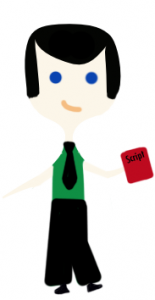We’ve recently finished a production of How To Succeed in Business without Really Trying, over at The Music Room – School of Performing Arts in Orange. Our students did a great; job… However, a few days before the show opened there were still several people who were not OFF BOOK (memorized). We had a long talk about the imporatence of being off book, and then the difficulties some people have with memorization.

Our “Finch” and “Biggly” were kind enough to let me share this awesome photo of them pounding their lines into their heads with the help of their Heddi Lamarr… Ha! These two ended up memorizing all of their lines and giving a fab show opening night.
Our discussion lead me to realize you all might like some help with this often daunting task. I’ve been doing some research and I’ve compiled the following TEN TIPS TO HELP YOU GET OFF BOOK. I even came up with a few ideas that were brand new to me – I can’t wait to try them out!
Let me know which of these help you, or if you have any other tips by leaving a comment in the box at the bottom of this post. In a future post, I’ll be sharing reasons why memorizing your lines.
TEN TIPS TO HELP YOU GET OFF BOOK (MEMORIZE LINES)
1. KNOW THE STORY YOU ARE TELLING
I can’t tell you how crazy it is when we are in rehearsal and actors are shocked by something their character says or does. Sometimes I want to say “WHAT!!!???”  I usually make a little joke about it and we all laugh it off, but seriously, come on guys, read your script!! So much about our characters can be discovered by knowing where they are going. AND, if you know where your character is going, you’ll be more likely to remember the lines that are telling the story because you’ll actually know the story. : )
I usually make a little joke about it and we all laugh it off, but seriously, come on guys, read your script!! So much about our characters can be discovered by knowing where they are going. AND, if you know where your character is going, you’ll be more likely to remember the lines that are telling the story because you’ll actually know the story. : )
When I worked at the Fireside Theatre our stage manager MJ Bernhardt had an awesome policy for understudies: “Tell the story and don’t fall off the stage!” Ha! Sounds crazy, but it’s true! While it is very important to know the actual lines that were carefully written in the script, telling the story in your own words is a good place to start.
2. IDENTIFY THE TRAFFIC SIGNS ALONG THE WAY
This is great for VISUAL LEARNERS. There are a few ways to put this technique into action; here are some examples:
- While you are reading your play, scene, monologue, or song, put a little star, check mark, or number next to points in the story that seem monumental to your character. These little moments will all add up to one bigger picture, and if you mark them you can go back and scan through quickly so you have a general overview of your characters journey.
- If smaller marks don’t seem to work for you, you can also highlight your lines with different colors. For visual learners this can be a great trick because it causes the text to pop off the page.
- This technique also works with tabs on the side of the page. Simply marking your scenes with tabs helps you to take the task in smaller chunks. It also helps you to find specific scenes right away which is beneficial during rehearsal.
3. START WITH THE ENDING
This is a technique I originally learned from choreographer Susan Cable, while playing Anna Held in a production of Tintypes. After learning choreography, we would go back and clean it by starting with the end of the number. Once that was clean, we would attack another section that was a little closer to the beginning of the song and then clean that, running all the way through the end. I love using this technique! Not only does it help with the first tip, KNOW THE STORY YOU ARE TELLING, but you also ensure that end of the show is really well rehearsed.
***This is a favorite tip of recent Emerson College Graduate, actress and Prepared Performer team member, Shanae Burch***
4. WORK YOUR BEATS
We will soon be offering a free e-book 6 STEPS TO ACTING WITH LESS EFFORT. I love using this 6-step process with my students.
It’s a process I developed by combining techniques I learned from several teachers into a clear cohesive system. One of the steps in this list is to “work your beats.” In acting, the term “beat” is defined as “the smallest unit of action.” It was originally introduced by Constantine Stanislavski. Essentially, you divide your script/monologue/song into small sections. It can seem a little overwhelming at first, but if you download our free e-book, you’ll be sure to understand. I promise it will not only help you to memorize your lines, but to deliver them with more meaning and natural ease. – Click here to sign up for this free tool, which will be released soon.
5. RECORD, LISTEN, SPEAK, REPEAT/REHEARSE WITH A FRIEND
This is great for AUDITORY LEARNERS. This one is super straight forward. There are three ways to approach this technique:
- Record yourself saying your lines: listen to them, speak them out loud, and do it over and over again;
- Record yourself saying everyone else’s lines with a pause between them for where your lines are – listen to the lines, hit pause and speak your lines, hit play to hear their lines, and do it over and over again;
- Get together with a friend – like our awesome students in the photo at the top of this post. It can be really easy to cheat if we are holding our own script with our hand over our lines. Putting the script in a friend’s hands forces us to really up our game. DO IT OVER AND OVER AGAIN! : )
***This one is Prepared Performer instructor Charna Lopez’s favorite!***
6. GET A MOVE ON
That’s right…get on your feet and move while learning your lines. I don’t mean you have to run your blocking (although that is a good idea, too). I mean do something totally unrelated to your script. Wash the dishes, paint your nails, clean your room, hang new shelves in your garage, or work out. Not only will you be super productive, your muscles will help you retain the info you are working so hard to grasp. Your brain shouldn’t have do it on it’s own! Do some squats while you memorize and let your legs do part of the heavy lifting. Literally.
*** This has been proven in many studies – you can download one of the studies: I found informative by clicking here. “The results of the two experiments indicated that movement instruction significantly enhanced memorization of text, rhythm, and pitch.”***
*** This is Prepared Performer Instructor/Photography Daryl Getman‘s favorite tip***
7. MAKE IT A SILLY SONG OR DANCE
Ever wonder why we teach our little ones nursery rhymes?  We all know our ABC’s and we all know that the wheels on the bus go round and round… why? Because, music, movement and rhymes make it fun! Try rehearsing your lines to a song or add some choreography. It will help! Mix it up! We can easily get frustrated when we are trying to learn loads of lines, and it’s really empowering if we can help ourselves and lighten the mood!
We all know our ABC’s and we all know that the wheels on the bus go round and round… why? Because, music, movement and rhymes make it fun! Try rehearsing your lines to a song or add some choreography. It will help! Mix it up! We can easily get frustrated when we are trying to learn loads of lines, and it’s really empowering if we can help ourselves and lighten the mood!
8. WRITE DOWN YOUR LINES
This is great for KINESTHETIC LEARNERS. Once you’ve started working on your lines, open a notebook and write all of your lines down at least THREE TIMES! They don’t need to be legible – but you need to go through the motion of writing out each word. If you are like me – your brain can go far faster than your hand. This technique forces you to slow down and really process each word. The following article from Dustin Wax at Life Hacker says, “when we write… we are putting some degree of thought into evaluating and ordering the information that we are receiving. [Which] is what helps fix ideas more firmly in our minds.”
***Here’s a great article on why this works.***
***This is my favorite method.***
8 1/2. POST-IT!
After you’ve written out your lines, write them on post-its! I love post-it notes. I love them in all shapes and sizes. (Have you ever seen these GIANT post-it’s – Crazy!) Right now, I have a post-it with the question “How will this contribute to my overall goal?” stuck to my computer. I’m working really hard on staying focused, so I have this little reminder staring me in the face every day. Why not try this with your lines. If there are specific lines that are real buggers, write them on post-it notes and put them in places where you are sure to see them every day. Here’re some ideas for placement:
- bathroom mirror
- computer screen
- the cover of a school notebook
- in the car
- the refrigerator
- on your hand – I am HORRIBLE about writing things on my hand! I know, I’m a little too old for that, but it really helps me. Ha! Be careful about how long your lines are and be sure to wash them off before your show!!!
9. GET READY FOR THIS ONE… EAT SKITTLES!
My friend Orange County RAWartist and filmmaker Dustin Willis, shared this technique with me:
I laughed out loud when I read it, but I think he’s totally right. He suggested eating skittles and memorize sections according to the flavor. I’ve yet to try this one, but I totally buy it! Here’s how we think it would work. Divide your lines up into sections, eg., Scenes, acting beats, or paragraphs . Then, divide up your skittles into colors. I would put them in ROY G BIV order – like the rainbow. Then, eat a different color skittle while memorizing each part. Heck, I think it’s definitely worth a shot! Friend and actress Kacey Griffin (you may have spotted her on in this episode of the first season of the TV show Grimm) suggested eating different types of fruit in a fruit salad instead of skittles, which is probably a better direction.
***Warning – I did a production of Fiddler on the Roof where a cast member (who shall remain nameless) was eating jelly beans before he went on stage. Once he hit the stage he tried to put them in his pocket and missed (or there was a hole) and the jelly beans flew all over the stage. It was NOT OK – although, really funny. So be careful not to do this with skittles! ***
***Note – Dustin said he learned this technique in school and there was a study on it, but we haven’t been able to locate the study. If you find it, let us know in the comment box on the bottom of this page.***
*** Click here for the original link for this photo.***
10. GO TO THE “BEACH”
Sometimes the best work we can do is NO WORK AT ALL. Jazz songstress Jenny Swoish was one of my first students. I’m so proud of the performer she has become, but when she was really young, we spent a lot of time talking about how easy it was to get stressed out. I reminded Jenny that is was so important to set aside time for FUN! So, we developed a code word for chilling out. Whenever she was caught up in her head I would say “Go to the Beach!” It totally worked, and we shared that little phrase for years, ’cause I needed the reminder too! If you have been cramming lines, your eyes are getting blurry, and your head is starting to pound…put down your script and do something fun!
BONUS!! CHECK OUT THESE APPS!
I’ve recently come across a few actor apps for iphone/ipad/android. I’m planning a post with loads of details about these apps (compare and contrast, etc.) but, for now, here’re two that I think would be loads of help next time you need to memorize lines:
https://www.scenepartnerapp.com
I don’t actually have this app yet… but I will be getting it! Here’s what they say it can do:
- Hear your lines on your iPhone, iPod Touch or iPad using the two male and female voices provided or download additional voices for more variety.
- 19 Text-To-Speech (TTS) voices are available, including 8 British voices — includes two voices free!
http://www.rehearsaltheapp.com/
I read an article about this app in Backstage a few weeks ago and I downloaded it right away. It honestly seems so cool! I’m still playing with it, but I plan on posting a tutorial/review soon. It’s a little pricey for an app, but with the amount of time we spend on the go, I think it could be so useful! You can open scripts in .pdf formats and also highlight, take notes and record your lines. SO COOL!




